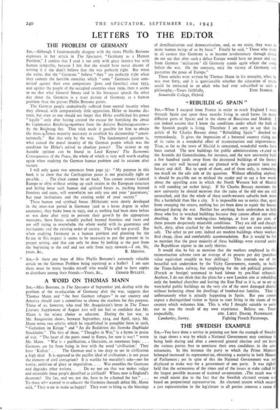THE PROBLEM OF GERMANY
LETTERS TO THE ED TOR
SIR,—Although I fundamentally disagree with the views Phyllis Bottome expresses in her article in The Spectator, " Germany as a Human Problem," I confess that I read it not only with great interest but with human sympathy, because I felt that she would have never dreamt of writing it it she didn't believe that she was perfectly right. But when she writes that the " Germans " believe " they " are perfectly right when they commit the horrible atrocities which " some Germans have com- mitted against their own compatriots (Jews and Gentiles) since 1933, and against the people of the occupied countries since 1939, then it seems to me that what General Smuts said in his broadcast speech the other day about the Germans is a truer picture of Germany as a human problem than the picture Phillis Bottome paints.
The German people undoubtedly suffered from mental insanity when they allowed, with comparatively little opposition, Hitler to become dic- tator, but even so one should not forget that Hitler established his power " legally " only after having created the excuse for banishing the about 8o Communist Reichstag-members from the derisive Reichstagssession- by the Reichstag fire. That trick made it possible for him to obtain the three-qaarters majority necessary to establish his dictatorship " consti- tutionally." But that only by the way. The fundamental question is, what caused the moral insanity of the German people which was the condition for Hitler's arrival to absolute power? The answer m my humble opinion can be found in Lord Keynes' The Economic Consequences of the Peace, the whole of which is very well worth reading again when studying the German human problem and its soiuuon after victory.
I will only quote two sentences from page 33: " My purpose in this book is to show that the Carthaginian peace is not practically, right or possible. . The clock cannot be set back. You cannot restore Central Europe to 1870 without setting up such strains in the European structure and letting loose such human and spiritual forces as. pushing beyond frontiers and races, will overwhelm not only you and your guarantees,' but your institutions and the existing order of your society."
These human and spiritual forces (Hitlerism) were slowly developed in the inter-war period in Germany (and to a lesser degree in other countries), they broke loose in 1933, and as nothing had been done before or was done after 1933 to prevent their growth by the appropriate measures, these forces actually pushed beyond frontiers and races and are still trying to overwhelm the whole world with its guarantees and institutions and the existing order of society. They will not prevail. But when studying Germany as a human problem and planning for the ftrure in This respect it seems to be necessary to put the present in its proper setting, and that can only be done by looking at the past from the beginning to the end and not only from 1933 onward.—I am, Sir; Sin,—In there any hope of Miss Phyllis Bottome's extremely valuable article on the German Problem being reprinted as a leaflet? I am sure there must be many besides myself who would be glad to have copies
to distribute among their friends.—Yours, &c., GERALD BULLETT.


























 Previous page
Previous page